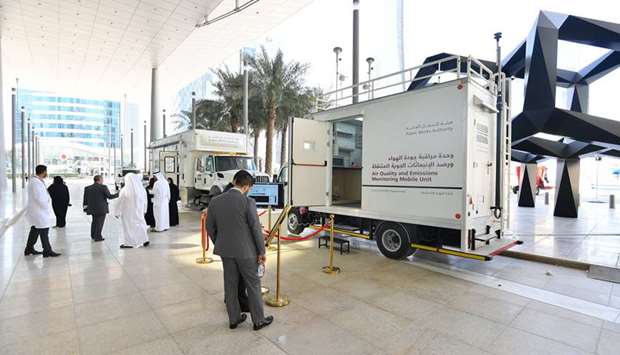The Public Works Authority, Ashghal, is highlighting its key eco-friendly projects and initiatives at Qatar’s First International Environmental Exhibition EnviroteQ, organised by the Ministry of Municipality and Environment at the Doha Exhibition and Convention Centre until tomorrow.
Ashghal is keen to present a number of initiatives aiming at achieving sustainability of projects and environment preservation, according to a statement issued yesterday.
Ashghal has showcased green buildings, recycling of demolition, drilling and tyres waste, and their use in the implementation of road projects, in addition to presenting the use of sewage treatment for irrigation, beautification and agriculture, and an awareness campaign on dealing with sewage water. Ashghal has set up six main and 17 small plants for sewage treatment, using advanced treatment and sterilising techniques to provide clear water that is used for irrigation and landscaping.
The Doha North Treatment plant, one of Ashghal’s most important sewage plants, is considered the largest wastewater treatment facility in the region, and the first facility developed with a thermal drying plant. The plant is designed to produce 245,000 cu m of treated water/day, and is surrounded by more than 90,000 trees, 50 picnic areas and bird watching ponds.
In order to achieve sustainability in projects and reduce cost, Ashghal implements the most recent practices in road construction and pavement, and has launched a number of initiatives including the usage of recycled construction materials in its projects, such as asphalt waste, crumb rubber, steel slag and demolition and drilling waste. The use of recycled construction materials contributes to reducing the cost of materials used in projects by 15%, while achieving the highest quality.
Ashghal started to collect excavation and demolition waste five years ago and prepared a recycling plan to eliminate construction waste. It succeeded in using approximately 60mn tonnes of demolition waste and using it in sand layer for some road projects. Ashghal also set conditions for project contractors in some areas to use certain percentage of recycled construction materials with varying rates ranging from 15% in asphalt layers to 100% for some layers of soil fill and layers under utility lines.
With around 1.9mn waste tyres disposed every two to four years in Qatar, Ashghal’s Road Project Department has started an initiative to grind and process them into crumb rubber and use as a modifier into asphalt concrete mixes in road construction projects, parking lots, and other areas. The benefits of crumb rubber modified asphalt pavement are increased resistance to rutting, reduction of pavement fatigue cracking and pavement noise and increased flexibility and durability.
Ashghal designs the new health centre buildings according to the highest standards of quality and safety and all the criteria set by Global Sustainability Assessment System (GSAS) since operational and architectural considerations were taken to accomplish a 3-star environmental level in terms of energy saving and environment preservation.
During the exhibition, Ashghal activated the Mobile Unit for Air Quality Control and Air Emission Monitoring.
The mobile integrated unit is designed to assess air quality within the scope of the authority’s projects and to monitor any emissions in order to reduce them and their negative impact on the environment that may affect the health of workers.
The unit includes measuring all types of emissions, measuring odours, oxygen content in the air, noise rate and percentage of chlorine gas in the atmosphere, in order to maintain the health of workers at project sites and reduce air pollution.

Air quality and emissions monitoring mobile unit exhibited by Ashghal at EnviroteQ.
